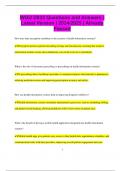WGU D033 Questions and Answers |
Latest Version | 2024/2025 | Already
Passed
How does data encryption contribute to the security of health information systems?
✔✔Encryption protects patient data during storage and transmission, ensuring that sensitive
information remains secure and confidential, even in the event of a cyberattack.
What is the role of electronic prescribing (e-prescribing) in health information systems?
✔✔E-prescribing allows healthcare providers to send prescriptions electronically to pharmacies,
reducing medication errors and improving prescription accuracy and safety.
How can health information systems help in improving hospital workflows?
✔✔Health information systems streamline administrative processes, such as scheduling, billing,
and patient record-keeping, allowing healthcare staff to focus more on patient care.
What’s the benefit of having a mobile health application integrated into health information
systems?
✔✔Mobile health apps give patients easy access to their health data, appointment schedules, and
communication tools with their providers, improving overall patient engagement and care.
1
,How does interoperability enhance the effectiveness of health information systems?
✔✔Interoperability enables systems to communicate with each other, allowing for seamless data
exchange, reducing duplication of tests, and improving the coordination of patient care across
different providers.
Why is training healthcare staff on new health information systems so crucial?
✔✔Proper training ensures that staff can effectively use new systems, reducing errors, improving
efficiency, and maximizing the benefits of the technology for patient care.
What is the key role of a Health Information Management (HIM) system?
✔✔The key role is to ensure the accurate collection, storage, and management of health data,
helping organizations deliver quality care while maintaining privacy and compliance.
How do health information systems improve patient engagement?
✔✔By allowing patients to access their health records, communicate with their healthcare
providers, and track their progress, health information systems empower patients to take an
active role in their care.
2
,What is the role of predictive analytics in healthcare information systems?
✔✔Predictive analytics uses historical data to forecast future outcomes, helping healthcare
providers proactively manage patient care, anticipate risks, and optimize treatment plans.
How does Health Information Exchange (HIE) improve patient care?
✔✔HIE allows healthcare providers to exchange patient information across different
organizations, ensuring that patients receive timely, coordinated care regardless of where they
seek treatment.
Why is it essential for health information systems to be HIPAA-compliant?
✔✔HIPAA compliance ensures that patient data is protected, fostering trust between patients
and healthcare providers while avoiding legal consequences from data breaches.
What role does Artificial Intelligence (AI) play in health information systems?
✔✔AI aids in automating routine tasks, analyzing complex data for patterns, assisting in
decision-making, and enhancing diagnostic accuracy in healthcare settings.
What challenges do healthcare providers face when implementing new health information
systems?
3
, ✔✔Challenges include staff resistance to change, data migration issues, high costs of
implementation, and ensuring the new system meets regulatory and interoperability standards.
Why is standardizing medical data formats important in health information systems?
✔✔Standardized formats make it easier to share data between different systems and
organizations, reducing errors and ensuring that all healthcare providers are working with the
same, accurate information.
How can health information systems support telemedicine services?
✔✔Health information systems can store and transfer patient data securely, allowing healthcare
providers to access real-time information during telemedicine consultations and ensuring
continuity of care.
What is the concept of data governance in health information systems?
✔✔Data governance involves setting policies and procedures to ensure data quality, security,
privacy, and compliance with regulations, thereby maintaining the integrity of the health
information.
How do health information systems enhance decision-making in healthcare?
4




